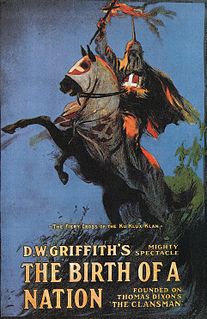
The Birth of a Nation is a 1915 American silent epic drama film directed and co-produced by D. W. Griffith and starring Lillian Gish. The screenplay is adapted from the novel and play The Clansman, both by Thomas Dixon Jr., as well as Dixon's novel The Leopard's Spots. Griffith co-wrote the screenplay with Frank E. Woods, and co-produced the film with Harry Aitken. It was released on February 8, 1915.

David Wark Griffith was an American director, writer, and producer who pioneered modern cinematic techniques. He is remembered for The Birth of a Nation (1915) and Intolerance (1916). The Birth of a Nation made use of advanced camera and narrative techniques, and its popularity set the stage for the dominance of the feature-length film in the United States. The film has sparked significant controversy surrounding racism in the United States, focusing on its negative depiction of black people and the glorification of the Ku Klux Klan. Today, it is both acclaimed for its radical technique and condemned for its inherently racist philosophy. The film was subject to boycotts by the NAACP; screenings caused riots at several theaters and it was censored in many cities, including New York City. Intolerance was an answer to his critics.

35 mm film (millimeter) is the film gauge most commonly used for motion pictures and chemical still photography. The name of the gauge refers to the width of the photographic film, which consists of strips 34.98 ±0.03 mm (1.377 ±0.001 inches) wide. The standard negative pulldown for movies is four perforations per frame along both edges, which results in 16 frames per foot of film. For still photography, the standard frame has eight perforations on each side.
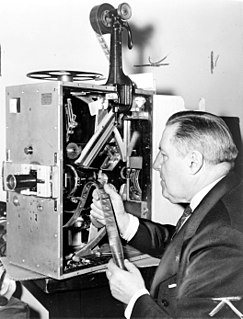
Gottfried Wilhelm "Billy" Bitzer was a pioneering American cinematographer notable for his close association with D. W. Griffith.

Corinne Mae Griffith was an American film actress, producer and author. Dubbed The Orchid Lady of the Screen, she was one of the most popular film actresses of the 1920s and widely considered the most beautiful actress of the silent screen. She was nominated for the Academy Award for Best Actress for her performance in The Divine Lady.

Intolerance is a 1916 epic silent film directed by D. W. Griffith. Subtitles include Love's Struggle Throughout the Ages and A Sun-Play of the Ages.
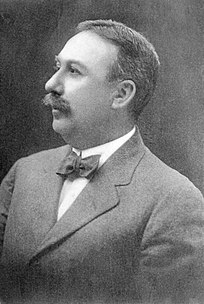
Edwin Stanton Porter was an American film pioneer, most famous as a producer, director, studio manager and cinematographer with the Edison Manufacturing Company and the Famous Players Film Company. Of over 250 films created by Porter, his most important include Jack and the Beanstalk (1902), Life of an American Fireman (1903), The Great Train Robbery (1903), The Kleptomaniac (1905), Life of a Cowboy (1906), Rescued from an Eagle's Nest (1908), and The Prisoner of Zenda (1913).
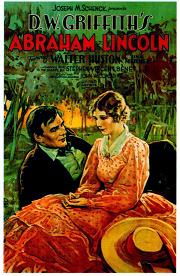
Abraham Lincoln, also released under the title D. W. Griffith's "Abraham Lincoln", is a 1930 pre-Code American biographical film about Abraham Lincoln directed by D. W. Griffith. It stars Walter Huston as Lincoln and Una Merkel, in her second speaking role, as Ann Rutledge. Her first speaking role was in a short film, Love's Old Sweet Song (1923) filmed in the Phonofilm sound-on-film process. The script was co-written by Stephen Vincent Benét, author of the Civil War prose poem John Brown's Body, and Gerrit Lloyd. This was the first of only two sound films made by Griffith.
The Biograph Company, also known as the American Mutoscope and Biograph Company, was a motion picture company founded in 1895 and active until 1916. It was the first company in the United States devoted entirely to film production and exhibition, and for two decades was one of the most prolific, releasing over 3000 short films and 12 feature films.
During the height of silent film as a medium, Biograph was America's most prominent film studio and one of the most respected and influential studios worldwide, only rivaled by Germany's UFA, Sweden's Svensk Filmindustri and France's Pathé. The company was home to pioneering director D. W. Griffith and such actors as Mary Pickford, Lillian Gish and Lionel Barrymore.

Robert Emmett "Bobby" Harron was an American motion picture actor of the early silent film era. Although he acted in over 200 films, he is known for his roles in the D.W. Griffith directed films The Birth of a Nation (1915) and Intolerance (1916).

Hearts of the World is a 1918 American silent World War I propaganda film written, produced and directed by D. W. Griffith. In an effort to change the American public's neutral stance regarding the war, the British government contacted Griffith due to his stature and reputation for dramatic filmmaking.
Ernest Jacob Haller, sometimes known as Ernie J. Haller, was an American cinematographer.

Mary Pickford (1892–1979) was a Canadian motion picture actress, producer, and writer. During the silent film era she became one of the first great celebrities of the cinema and a popular icon known to the public as "America's Sweetheart".

America, also called Love and Sacrifice, is a 1924 silent historical war romance film. It describes the heroic story of the events during the American Revolutionary War, in which filmmaker D. W. Griffith created a film adaptation of Robert W. Chambers’ novel The Reckoning. The plot mainly centers itself on the battles of the New York State, with romance spliced into the individual movie scenes.

The Fall of a Nation is a 1916 American silent drama film directed by Thomas Dixon, Jr., and is a sequel to the 1915 film The Birth of a Nation, directed by D. W. Griffith. Dixon, Jr. attempted to cash in on the success of the controversial first film. The Fall of a Nation is considered to be the first ever film sequel. Based upon The Fall of a Nation, written by the director, the film is now considered lost.
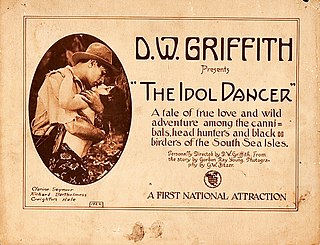
The Idol Dancer is a 1920 American silent South Seas drama film produced and directed by D. W. Griffith. It stars Richard Barthelmess and Clarine Seymour in her final film role. Seymour was a young actress Griffith was grooming for stardom. She died of pneumonia shortly after emergency surgery for an intestinal blockage on April 24, 1920, less than a month after the film premiered.

The One Woman: A Story of Modern Utopia is a 1903 novel by Thomas Dixon, Jr..
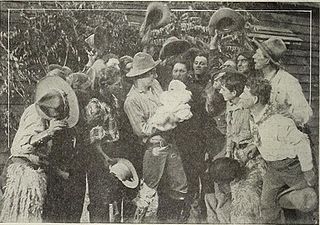
Life's Shop Window is a 1914 American silent drama film directed by J. Gordon Edwards and starring Claire Whitney and Stuart Holmes. It is a film adaptation of the 1907 novel of the same name by Annie Sophie Cory. The film depicts the story of English orphan Lydia Wilton (Whitney), and her husband Bernard Chetwin (Holmes). Although Wilton's marriage is legitimate, it was conducted in secret, and she is accused of having a child out of wedlock. Forced to leave England, she reunites with her husband in Arizona. There, she is tempted by infidelity with an old acquaintance, Eustace Pelham, before seeing the error of her ways and returning to her family.

On July 9, 1937, a major fire broke out in a 20th Century Fox film storage facility in Little Ferry, New Jersey, United States. Flammable nitrate film had previously contributed to several high-profile fires in film industry laboratories, studios, and vaults, although the precise causes were often unknown. In Little Ferry, gases produced by decaying film, combined with high temperatures and inadequate ventilation, resulted in spontaneous combustion.
The Yaqui Cur is a 1913 American western silent black and white film directed by D.W. Griffith, written by Stanner E.V. Taylor and starring Robert Harron, Kate Bruce, Walter Miller, Charles Hill Mailes and Victoria Forde. Griffith directed seven films with more than one reel, including The Yaqui Cur and The Little Tease (1913).

















